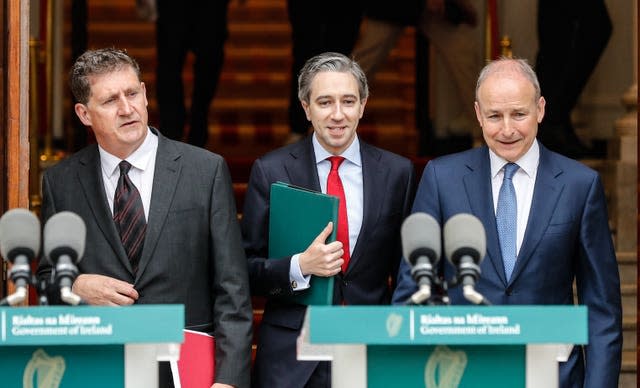Marathon election counts continue in Ireland with final result due in Dublin
Marathon counts to fill Ireland’s European parliamentary seats are continuing, with Dublin set to be the first constituency to finish.
In the local elections battle, Fianna Fail was neck and neck with Fine Gael on 245 seats each with only a handful of 949 seats left to declare.
In the landmark poll in Limerick for Ireland’s first directly elected mayor, independent candidate John Moran secured victory late on Monday afternoon.
Results emerging from the three elections, which were held last Friday, have provided a political fillip for coalition partners Fine Gael and Fianna Fail, while Sinn Fein has initiated a review after performing well below the party’s own expectations.

Both main government parties attracted around 23% of first preference votes, while Sinn Fein trailed in on 12% – a dramatic turnaround in fortunes for the main opposition party which emerged from the 2020 general election winning the popular vote on 24.5%.
While it will take a number of days before all the votes are counted, with the European picture set to be the last finalised, the results to date have fuelled speculation that the coalition may look to call a general election earlier than the current projected timeline of spring 2025.
However, the leaders of all three coalition parties – Taoiseach and Fine Gael leader Simon Harris, Tanaiste and Fianna Fail leader Micheal Martin and Green Party leader Eamon Ryan – have all insisted they remain committed to the current government going full term.
Speaking before Cabinet on Tuesday, Mr Harris said his intention of when to call a general election has not changed.
“I am very pleased with the results from the European and local elections. My party has received the most first preference votes than any other party in the local elections,” he said.
“My party polled 23% of the first preference votes in the local elections.
“We are in (with) a very good chance for four MEP seats as well.”
Mr Martin said he is “delighted” that Fianna Fail remains the largest party in local government, but added he will assess where they did well and areas he believes could have done better.
Both Mr Harris and Mr Martin expressed concern over a rise in the number of MEPs elected who hold hard right views.
“I am concerned about the rise of the far right, and I think it can’t be overstated in this country, but I think we have seen it significantly grow in some other European countries and we are not immune from it here,” Mr Harris added.
“I think now is the time for centrist politicians to show courage and guts on big issues because I think if we shirk on major issues, like migration policy, that allows a vacuum to develop and that gets filled by extremes.”
For her part, Sinn Fein leader Mary Lou McDonald, who is now facing questions over her stewardship of the party, struck a defiant tone on Monday night as she urged Mr Harris to “bring it on” and call an early election.
Fine Gael’s Sean Kelly became the first MEP elected in Ireland, taking the first of five seats in the Ireland South constituency on Monday night.
Fianna Fail’s Billy Kelleher is in place to take the second seat, but the final three seats are considered too close to call.
Independent TD Michael McNamara and Fianna Fail candidate and 1994 Eurovision host Cynthia Ni Mhurchu are polling in second and third place.
Ms Ni Mhurchu said she was “absolutely honoured” to have received enough first preference votes to put her in contention for a seat.
Asked if she would run in the general election if she did not become an MEP, she said: “So my experience of politics has been so, so positive, I probably would find it very hard to leave that all behind me.”
Outgoing MEP Mick Wallace, Sinn Fein TD Kathleen Funchion and the Green Party’s Grace O’Sullivan also look to be in contention for the final seat.
The returning officer expects the count in Cork to extend into Thursday.
In the Dublin constituency, Fianna Fail’s Barry Andrews and Fine Gael’s Regina Doherty remain on course to secure two of the four seats after 18 counts.

Sinn Fein’s Lynn Boylan looks set to take a seat while Independent Ireland’s Niall Boylan and Labour’s Aodhan O Riordain are in a fight for the final seat.
The Midlands-North-West constituency saw the first count conclude late on Monday night, as officials grappled with the arduous process of whittling down 27 candidates vying for five seats.
Independent incumbent MEP Luke “Ming” Flanagan emerged as the frontrunner after topping the poll.
He was still leading the pack after seven counts on Tuesday. Next was Fine Gael’s first-time candidate and former jockey Nina Carberry, who was narrowly ahead of Fianna Fail’s Barry Cowen.
If the race stays as it currently stands, Maria Walsh will also be returning to Strasbourg as an MEP for Fine Gael in the fourth seat.
The fifth and final seat looks set to be taken by Independent Ireland candidate and former RTE correspondent Ciaran Mullooly, meaning Sinn Fein’s Michelle Gildernew, who was her party’s main hope of retaining a seat in the constituency, is likely to miss out.
Candidates have predicted the count in Castlebar could go on for several days before the results are confirmed.


